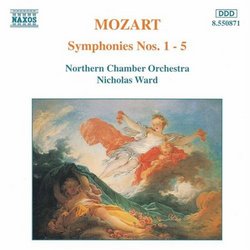Charming souvenirs of a young musical genius
klavierspiel | TX, USA | 09/08/2004
(5 out of 5 stars)
"Mozart's position as one of Western music's most wondrous prodigies needs no recounting; still, it is worthwhile listening to this recording of his first five symphonies (two of which are actually by other composers, "No. 2" by his father Leopold and "No. 3" by C.F. Abel) to be reminded anew just how precocious he was. The Symphony in E-flat, K. 16, written at the age of eight, reveals him already capable of writing a multimovement orchestral work that stands comparison with anything by his adult contemporaries. The first movement of K. 16 in particular has the unexpected turns of phrase, chains of suspensions that generate musical tension, and details in the orchestration that mark it as unmistakable Mozart. Indeed, it is clear if one listens to the first two symphonies in succession that little Wolfgang was even then a better composer than his father, whose Symphony in B-flat is dull and prosaic by comparison. The work by Abel has greater charm; indeed, Mozart thought highly enough of it to repeat one subsidiary phrase in the first movement exactly in his great, mature Sinfonia Concertante for violin and viola in the same key of E-flat. He also reused the opening theme of the finale of his own Symphony No. 5 in B-flat in the second-act finale of one of his greatest operas, The Marriage of Figaro. Throughout, Nicholas Ward and the Northern Chamber Orchestra make the best possible case for the music with their superbly polished playing. This CD is worth hearing not only as the record of a musical prodigy's first efforts and how favorably they compare to his contemporaries, but also as a vivid foretaste of the immortal that Mozart would become."


 Track Listings (16) - Disc #1
Track Listings (16) - Disc #1